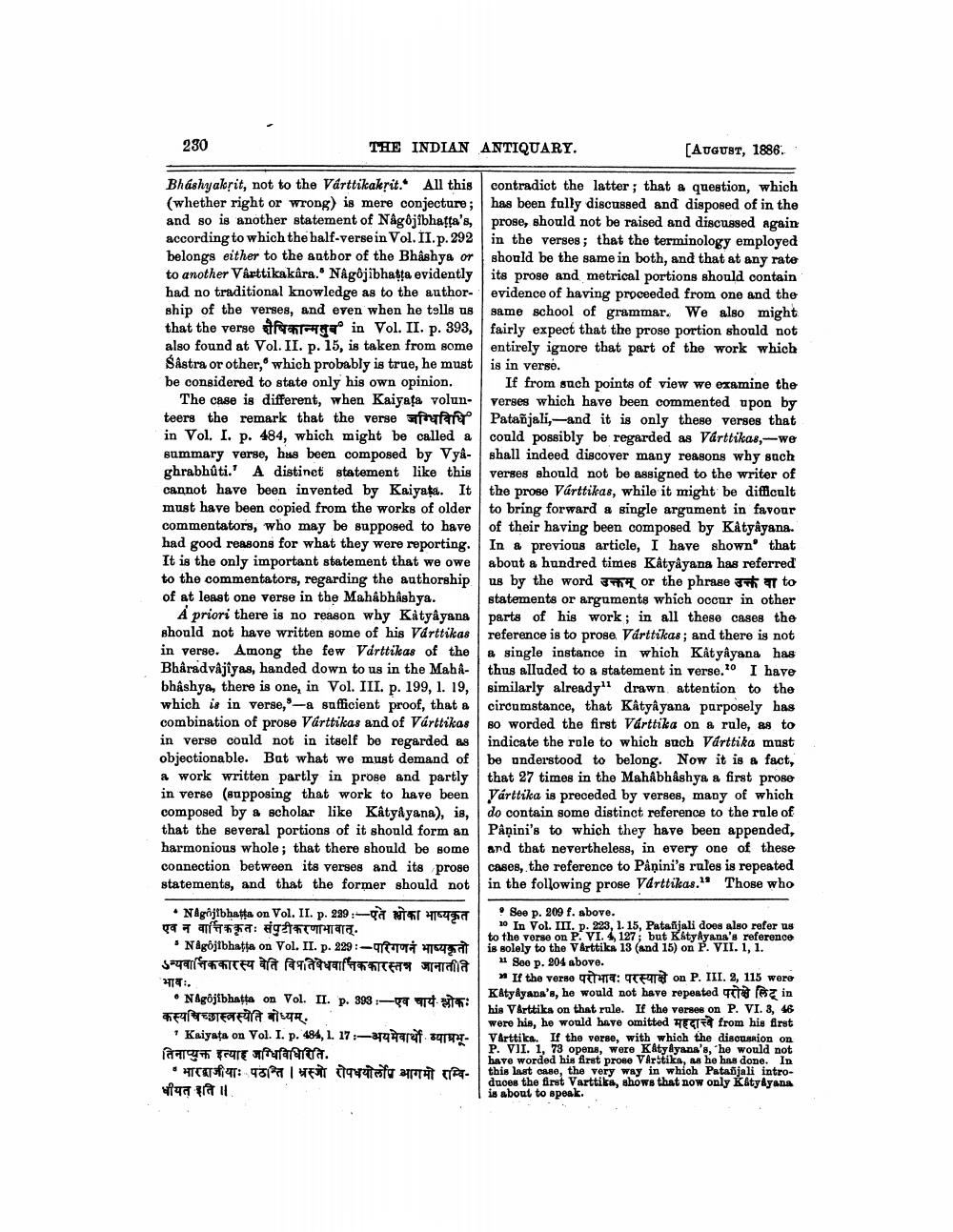________________
230
THE INDIAN ANTIQUARY.
[AUGUST, 1886.
Bhashyaksit, not to the Vårttikaksit.* All this contradict the latter; that a question, which (whether right or wrong) is mere conjecture; has been fully discussed and disposed of in the and so is another statement of Nâgôjibhatta's, prose, should not be raised and discussed again according to which the half-verse in Vol. II.p.292 in the verses; that the terminology employed belongs either to the author of the Bhashya or should be the same in both, and that at any rate to another Varttikakära. Någôjibhatta evidently its prose and metrical portions should contain had no traditional knowledge as to the author- evidence of having proceeded from one and the ship of the verses, and even when he tells us same school of grammar. We also might that the verse da ger in Vol. II. p. 393, fairly expect that the proge portion should not also found at Vol. II. p. 15, is taken from some entirely ignore that part of the work which Sastra or other, which probably is true, he must is in verse. be considered to state only his own opinion. If from such points of view we examine the
The case is different, when Kaiyata volun- verses which have been commented upon by teers the remark that the verse afert Patañjali, -and it is only these verses that in Vol. I. p. 484, which might be called a could possibly be regarded as Värttikas, --we summary verse, has been composed by Vya- shall indeed discover many reasons why such ghrabhûti.' A distinct statement like this verses should not be assigned to the writer of cannot have been invented by Kaiyata. It the prose Värttikas, while it might be difficult must have been copied from the works of older to bring forward a single argument in favour commentators, who may be supposed to have of their having been composed by Katyâyana. had good reasons for what they were reporting. In a previous article, I have shown that It is the only important statement that we owe about a hundred times Katyayana has referred' to the commentators, regarding the authorship us by the word or the phrases a to of at least one verse in the Mahâbhâshya. statements or arguments which occur in other
A priori there is no reason why Katyâyanaparts of his work; in all these cases the should not have written some of his Varttikas reference is to prose Värttikas; and there is not in verse. Among the few Vdrttikas of the & single instance in which Katyâyana has Bharadvajîyas, handed down to us in the Mahi-thus alluded to a statement in verse. I have bhâshye, there is one, in Vol. III. p. 199, 1. 19, similarly already" drawn attention to the which is in verse,-a sufficient proof, that a circumstance, that Katyayana parposely has combination of prose Värttikas and of Várttikas so worded the first Värttika on a rule, as to in verse could not in itself be regarded as indicate the role to which such Värttika must objectionable. But what we must demand of be understood to belong. Now it is a fact, & work written partly in prose and partly that 27 times in the Mahâbhâshya a first prose in verse (supposing that work to have been yárttika is preceded by verses, many of which composed by a scholar like Katyåyana), is, do contain some distinct reference to the role of that the several portions of it should form an Pånini's to which they have been appended, harmonious whole; that there should be some and that nevertheless, in every one of these connection between its verses and its prose cases, the reference to Påņini's rules is repeated statements, and that the former should not in the following prose Varttikas." Those who
• Nagijtbhata on Vol. II. p. 299:- 4450 ! See p. 209 f. above. एव न वार्निककृतः संपुटीकरणाभावात्.
In Vol. III. p. 223, 1. 15, Patafjali doos also refer us
to the verse on P. VI. 4127; but Katyayana's reference Nagojlbhatja on Vol. II. p. 229:-
49 is solely to the Varttiks 13 and 15) on P. VII. 1, 1. उन्यवानिककारस्य वेति विपतिषेधवानिककारस्तत्र जानातीति
See p. 204 above.
If the verse TTE: TE on P. III. 2, 115 were 277. NAgojfbhatta on Vol. II. p. 393 9 4 976:
Katy lyada's, he would not have repeated Terasz in
his Varttiks on that rule. If the verses on P. VI. 8, 46 कस्यचिच्छास्त्रस्यति बोध्यम्,
were his, he would have omitted HECT from his first Kaiyata on Vol. I. p. 484, 1. 17:—aparut
Vårttika. If the verse, with which the discussion on तिनाप्युक्त इत्याह जग्धिविधिरिति.
P. VII. 1, 73 opens, were Katydyana's, he would not
have worded his first prose Varstika, as he has done. In . TCTT: 7518 let out of armh- this last case, the very way in which Patañjali intro
duces the first Varttika, shows that now only K&tydyana what
is about to speak.




